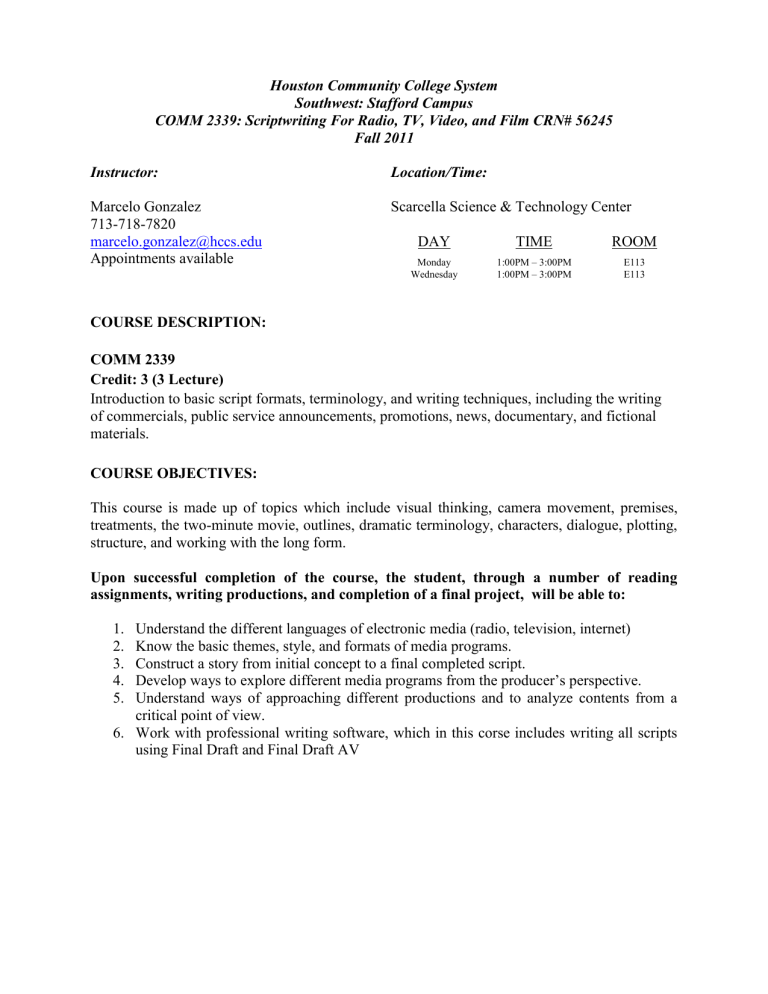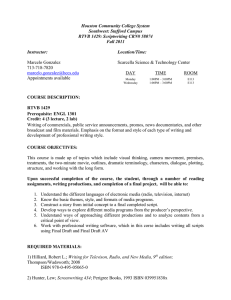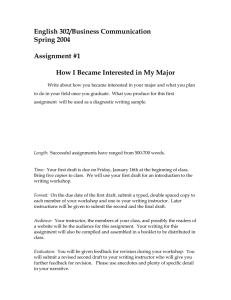Writing_Fa11_Comm.doc

COMM 2339: Scriptwriting For Radio, TV, Video, and Film CRN# 56245
Fall 2011
Instructor:
Houston Community College System
Southwest: Stafford Campus
Marcelo Gonzalez
713-718-7820 marcelo.gonzalez@hccs.edu
Appointments available
Location/Time:
Scarcella Science & Technology Center
DAY TIME ROOM
Monday
Wednesday
1:00PM – 3:00PM
1:00PM – 3:00PM
E113
E113
COURSE DESCRIPTION:
COMM 2339
Credit: 3 (3 Lecture)
Introduction to basic script formats, terminology, and writing techniques, including the writing of commercials, public service announcements, promotions, news, documentary, and fictional materials.
COURSE OBJECTIVES:
This course is made up of topics which include visual thinking, camera movement, premises, treatments, the two-minute movie, outlines, dramatic terminology, characters, dialogue, plotting, structure, and working with the long form.
Upon successful completion of the course, the student, through a number of reading assignments, writing productions, and completion of a final project, will be able to:
1.
Understand the different languages of electronic media (radio, television, internet)
2.
Know the basic themes, style, and formats of media programs.
3.
Construct a story from initial concept to a final completed script.
4.
Develop ways to explore different media programs from the producer’s perspective.
5.
Understand ways of approaching different productions and to analyze contents from a critical point of view.
6.
Work with professional writing software, which in this corse includes writing all scripts using Final Draft and Final Draft AV
REQUIRED MATERIALS:
1) Hilliard, Robert L.; Writing for Televison, Radio, and New Media, 9 th
edition;
Thompson/Wadsworth; 2008
Page 2 of 7
ISBN 978-0-495-05065-0
2) Hunter, Lew; Screenwriting 434 ; Perigree Books, 1993 ISBN 039951838x
3) Reliable Thumb Drive (w/ a back-up suggested)
COURSE REQUIREMENTS:
1.
READINGS/PARTICIPATION/QUIZZES a) Attend 87.5% of all classes b) Complete all reading assignments and quizzes, if any.
2.
WRITING EXERCISES
Writing exercises will be completed in Final Draft format and MS Word as indicated in each assignment. All written assignments including the Critique and the final project are due in
BLACKBOARD VISTA, one of HCCs online classroom programs located on the HCCS.EDU website. Please check the outline on page 5 for due dates. a) VISUAL THINKING: tell a story with no dialogue. Use image and sound effects only
MS Word: (1-2 pages) b) REVERSE PROCESS: Watch a TV/film scene and write it into script format.
Final Draft: (5 pages) c) A COMMERCIAL OR PSA: a 30 second spot selling a product, person, or concept
Final Draft: (2 pages max) d) INDUSTRIAL/CORPORATE
Final Draft: (5-10 pages) e) NARRATIVE SHORT SCRIPT (5-10 pages)
Final Draft: (5-10 pages)
3.
CRITIQUES: a) ONE SCRIPT CRITIQUE:
- read a feature script and write a critique. MS Word: (3-4 pages)
- Watch the produced program and compare the story to the script.
- Brief class presentation
4.
FINAL PROJECT: A SHORT MOVIE
Idea
2-minute movie
Character Bios
Outline
Act I
Act II
Act III
Rewrite
FINAL DRAFT
Page 3 of 7
You will be using Final Draft for most of the writing of most of your scripts. These programs are one of the industry standard programs used by professional television and film writers, directors and producers including at least half the Hollywood industry. The programs are actually pretty easy to use because they will automatically format your work for film and television production.
Final Draft is loaded on the computers in the E113 lab where we will spend the first half of many classes. All work turned into me must be completed on Final Draft unless noted by me. You may actually work on scripts using MS Word and then transcribe into Final Draft if the situation arises.
NOTE: All assignments, whether turned in on time or late, must be completed to receive a grade in the course. Please refer to the section on LATE WORK for assignment deadline policy.
GRADING POLICY:
Readings/Participation/quizzes/critique
Writing exercises
Final Project (Rough and Final Script)
10 points
40 points
50 points
TOTAL 100 points
Grading scale according to HCCS Student Handbook:
90-100
80-89
70-79
A
B
C
60-69
0-59
D
F
LATE WORK:
All assignments must be turned in on time. Delays or failure to submit the result of an assignment must be justified through a written note. It is up to the instructor to accept or not the reasons for the excuse. Unexcused delayed assignment will receive one letter grade lower than the final grade of the assignment for each class day the assignment is turned in late. Class days include all Tuesdays and Thursdays of the semester excluding holidays (Easter, Spring Break)
Page 4 of 7
ATTENDANCE/TARDINESS POLICY:
Students are expected to attend every class day and be present by the start of class. HCCS allows for a total of 12.5% lecture hours missed per semester; this is about 12 class hours or a little more than four classes. If you miss 5 or more classes, the instructor may drop you from the course.
A student must be in class within the first 20 minutes of class to be considered “on time”. After
20 minutes, a student is considered “tardy”, and this will result in a ½ absence.
Attendance is taken daily.
COURTESY:
In a polite society, and there is much that can be debated over just what constitutes a “polite” society today, there are certain rules of conduct in place so that people can show respect to one another. The instructor has three particular rules for this class.
LEAVING THE CLASS: If, for whatever reason, a student needs to leave the classroom during instruction, they must ask permission of the instructor. The instructor 99% of the time will allow the student to leave. The student does not need to give any explanation to the instructor nor will the instructor require any explanation.
CELL PHONES: All cell phones must be turned off during class. No exceptions . On rare occasion where it is absolutely imperative that the student be reachable by cell phone during class, such occasion must first be cleared with the instructor. If you need to make a call during class, please wait for the break.
DISRUPTIVE BEHAVIOR: Students and instructor are expected to conduct themselves in class professionally and with good manners. Behavior which disrupts instruction of the class will not be tolerated. This includes behavior such as, but not limited to arguing fighting, intimidating, and talking out of turn.
Violation of the above rules could lead to penalty of the participation portion of your grade and/or class expulsion.
COURSE OUTLINE (subject to change)
Page 5 of 7
Week Day Readings:
Week 1
Robert Hilliard
08/29 Ch 1
Readings:
Lew Hunter
Assignments Due
Introduction
Week 2
Week 3
Week 4
Week 5
Week 6
08/31 Ch 2
09/05 HOLIDAY
09/07
09/12
09/14
09/19
09/21
09/26
09/28
Ch 3
Ch 4
Ch 6
Ch 10
Week 7
Week 8
10/03
10/05
10/10
10/12
10/17
10/19
Week 9 10/24
10/26
Week 10 10/31
11/02
Ch 9
Ch 8
Ch 11
HOLIDAY
Ch 1
Ch 2
Ch 3
HOLIDAY
VISUAL THINKING
REVERSE PROCESS
COMMERCIAL/PSA
INDUSTRIAL/CORPORATE
SHORT NARRATIVE
Week 11 11/07
11/09
Week 12 11/14
11/16
Week 13 11/21
11/23
Week 14 11/28
11/30
Week 15 12/05
Ch 4
Ch 5
Ch 6
Ch 7
WITHDRAW DEADLINE
November 3, 4:30PM
Critique
FINAL: Idea
FINAL: 2-Minute Movie, Character Bio
FINAL: Outline
FINAL: ACT I
FINAL: ACT II
12/07
Week 16 12/12
Ch 8 FINAL: ACT III
FINAL: REWRITE
*** These two projects will be eligible for production by the Broadcast Technology program
Page 6 of 7
DISCIPLINE
REASONABLE ACCOMMODATION:
Any student with a documented disability (e.g. physical, learning, psychiatric, vision, hearing, etc.) who needs to arrange reasonable accommodations must contact the Disability Services Office at Southwest College at the beginning of each semester. Faculty are authorized to provide only the accommodations requested by the Disability
Support Services Office. If you have a disability that qualifies you under the ADA (Americans with Disabilities
Act), please contact Dr. Becky Hauri, 713-718-7909 to determine accommodations.
SCHOLASTIC DISHONESTY
Students are responsible for conducting themselves with honor and integrity in fulfilling course requirements. Penalties and/or disciplinary proceedings may be initiated by College
System officials against a student accused of scholastic dishonesty.
“Scholastic dishonesty” includes, but is not limited to, cheating on a test, plagiarism, and collusion.
“CHEATING” on a test includes:
Copying from another student test paper;
Using material during a test that are not authorized by the person giving the test;
Collaborating with another student during a test without authority;
Knowingly using, buying, selling, stealing, transporting, or soliciting in whole or part the contents of an unadministered test;
Bribing another person to obtain a test that is to be administered.
“PLAGIARISM”- means the appropriation of another’s work and the unacknowledged incorporation of that work in one’s written work offered for credit.
“COLLUSION”- means the unauthorized collaboration with another person in preparing written work offered for credit.
VIOLATIONS
Possible punishments for academic dishonesty may include a grade of “0” or “F” on the particular assignment, failure in the course, and/or recommendation for suspension or expulsion will be referred to the College Dean of Students for disciplinary disposition.
Students who wish to appeal a grade penalty should notify the instructional supervisor within
30 working days of the incident. A standing committee appointed by the College Dean of
Instruction will convene to sustain, reduce, or reverse the grade penalty. The committee will be composed of two students, two faculty members, and one instructional administrator. A majority vote will decide the grade appeal and its final.
Page 7 of 7
Statement of Workplace and Foundation Competencies
The Broadcast Technology program at the Southwest College of Houston Community College System is determined to prepare you with the knowledge and skill you need to succeed in today’s dynamic work environment. Towards this end, the following workplace competencies and foundation skills have been designed into the curriculum for this course.
COMMON WORKPLACE COMPETENCIES
Manage Resources: C1 Allocates Time
Work With Information:
Exhibit Interpersonal Skills:
C2
C3
C4
C7
C9
C10
Money
Material & Facilities
Human Resources
Interprets/Communicates
Information
Participates as Members of a
Team
Teaches Others
Must meet project deadlines
(all four)
Narrative Project #4 w/
Budget
Narrative Project #4 w/
Budget
Narrative Project #4 w/
Budget
All project Proposals and treatments
Group projects (four)
Apply System Knowledge:
Use Technology:
C13
C14
C15
C18
C19
Negotiates
Works with Diversity
Understands Systems
Selects Technology
Applies Technology
Classroom exercise: demonstrate the camera.
Narrative Project #4 w/
Budget; editing footage
Group Projects; all different format
Narrative Project #4 w/
Budget
Narrative Project #4 w/
Budget
Narrative Project #4 w/
Budget
FOUNDATION SKILLS
Demonstrate Basic Skills: F1
F3
Reading
Arithmetic
Demonstrate Thinking Skills:
Exhibit Personal Qualities:
F4
F5
F6
F7
F9
F11
F16
Mathematics
Listening
Speaking
Creative Thinking
Problem Solving
Knowing How to Learn
Self-Management
Midterm/Final: readings
Narrative Project #4 w/
Budget
Chapter 4: Calculating time
Midterm/Final: Lectures
Class Exercise: Present final proposal to class
All individual projects (4)
On-Location shooting of projects with limited resources/time
Picking up skills on the fly during projects.
Allocation of time/resources towards projects


